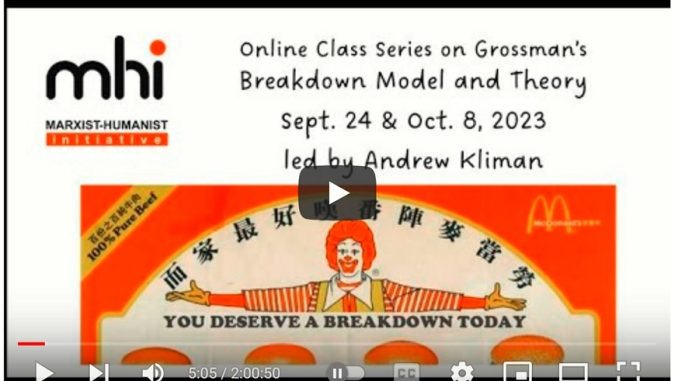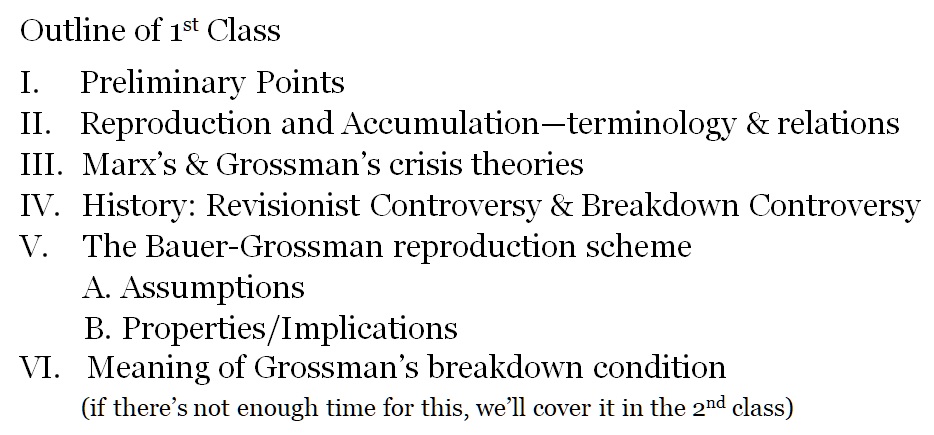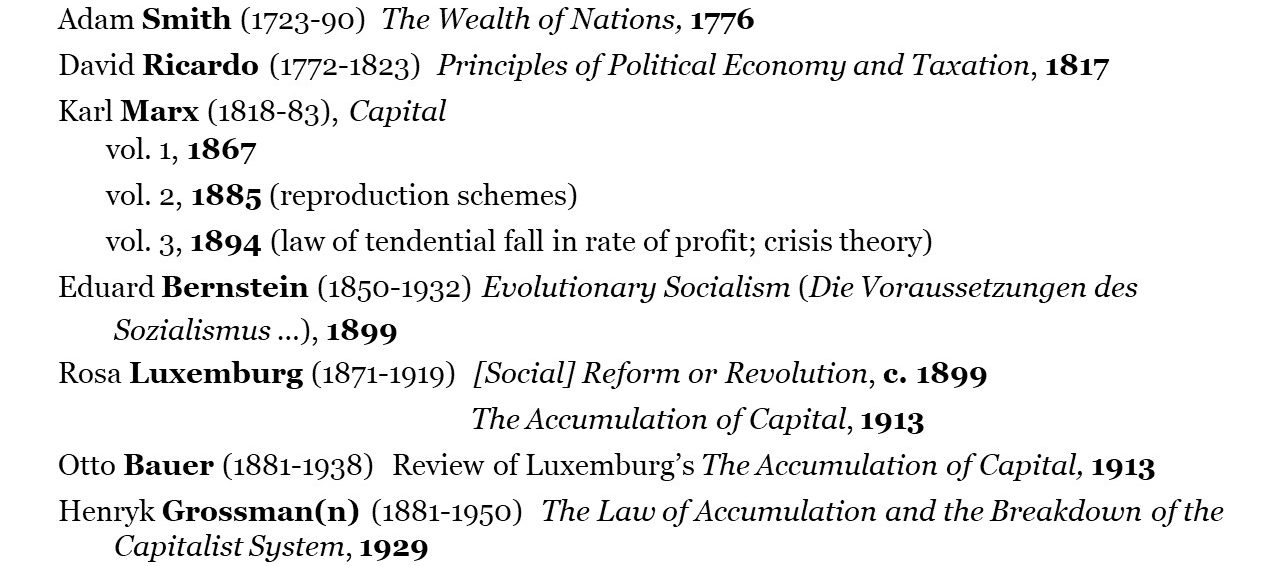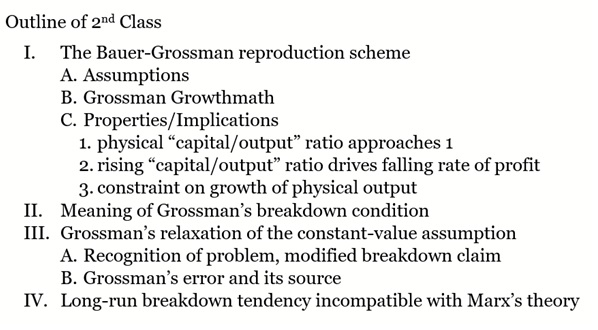
by MHI
October 11: Please see Video: Online Class Series on Grossman’s Breakdown Model and Theory, which contains videos of both class sessions and complete materials for the classes, and which supersedes the article below.
September 27: This article now includes the video of the first class session, and study questions and outline for the second class session.
Video of 1st Class Session
On Sunday, September 24 and Sunday, October 8, Marxist-Humanist Initiative will host a two-part, online class series, led by Andrew Kliman, on Henryk Grossman’s breakdown model and theory of capitalist breakdown. Grossman’s work is currently a major inspiration for radicals whose outlook is fatalistic and whose politics is informed by fatalism.

The sessions will take place on Zoom (and be available on YouTube thereafter). Each session will start at 1 pm, Eastern Daylight Time in the US, and last two hours. Participation is open to all. In each session, Andrew will give a presentation, after which there will be comments from designated discussants, followed by comments and questions from the online audience (using the “chat” feature). Confirmed discussants include Alan Freeman, Esteban Mora, A. Sebastián Hernández Solorza, and Nick Potts.
To join the classes, please click the following link:
https://zoom.us/j/97988444005?pwd=SEZlMmV2djY2NzJmb2J3YTllcmJ3Zz09
or open Zoom and log in with Meeting ID # 979 8844 4005 and passcode 463722.
Participants may, and are encouraged to, post questions and comments in the “chat.” During his presentations, Kliman will pause to read the chat and respond. During both classes, most of the second hour will be devoted to addressing these comments and questions.
Please continue to check this article for further updates.
Topics covered in the classes will include crisis theory (including Marx’s) before Grossman and the controversy surrounding Eduard Bernstein’s revisionism; the reproduction scheme developed by Otto Bauer and adopted by Grossman; the modifications to the basic scheme that Grossman introduced, and how Grossman’s theory has been received.
In addition to Grossman’s book, The Law of Accumulation and Breakdown of the Capitalist System, the presentations will be based primarily on Andrew’s recent critiques, published in With Sober Senses, of both the Bauer-Grossman reproduction scheme and Grossman’s modified breakdown theory, which he regards as fatally flawed. However, his goals in these sessions are to teach, explain, and contextualize the material, and to answer questions and criticisms, not just to repeat what he has written.
Additional Materials for 1st Class
Timeline of Main Authors & Works discussed in points III and IV
PDF: Mathematics of Growth and Breakdown in the Bauer-Grossman Model. During class, I intend to provide a very short introduction to growth-rate math (for the case of constant growth rates), and to cover the main points in this PDF. But there won’t be time during class to derive everything in step-by-step fashion, as I do in the PDF. So if you have a question about a particular step, just ask. The mathematics is not hard, but you do have to work through it patiently, point by point, to grasp it well.
PDF: Study Questions for 1st Class. The underlined terms in Questions 4 and 7 are links to online texts.
Additional Materials for 2nd Class
PDF: Study Questions for 2nd Class. Includes clickable links.
About the Discussants
1st class session
Alan Freeman is a former principal economist with the Greater London Authority and is now a research affiliate of the University of Manitoba. With Radhika Desai, he is co-director of the Geopolitical Economy Research Group. He is co-editor of the Future of World Capitalism book series with Pluto Books, and the Geopolitical Economy book series with Manchester University Press. Freeman is an honorary life vice-president of the Association for Heterodox Economics (www.hetecon.net) and a vice-chair of the World Association for Political Economy. He a former board member of Video Pool Winnipeg and the Winnipeg Symphony Orchestra.
Esteban Mora is a graduate student in Collective Communications Science at the Universidad de Costa Rica, where he also studied political economy. He writes on Marxist economics at marxparaelsiglo.blogspot.com, and is the author of a trilogy of books on cultural economics and cultural studies, written from a Marxist perspective. He has also written several other works on economics, semiotics and mathematics. At the Review of African Political Economy, he is a contributor to discussion of Harvey-Smith debate (between David Harvey and John Smith), and he is a frequent contributor to the leftist outlet Intervención y Coyuntura, located in Mexico. In addition, Esteban has worked as a member of an audiovisual production collective, collaborated on a university radio show and on a weekly music column at Semanario Universidad from Universidad de Costa Rica, and he has been a producer of image, music and text.
2nd class session
Sebastián Hernández is an economist from Mexico who works in the division of labor markets in the Inter-American Development Bank. He writes about Marxist economic theory; his most recent publications are about work intensity. Hernández also translates Marxist writings on economics and politics into Spanish. His translations are published in the Tiempos Críticos website.
Nick Potts, an emeritus professor of economics, has written about Marx’s value theory since 2000. His work has been split between arguing for the temporal single-system interpretation of Marx and trying to apply Marx’s consistent theory of value to the world (considering crisis, inequality, knowledge, the environment and finance). Potts has been on the Capital & Class editorial board since 2005, co-ordinating papers concerning Marx’s value theory. He is also co-editor of the 2015 collection, Is Marx’s Theory of Profit Right?
Editor’s Note. August 30: The list of confirmed discussants has been amended. September 7: Additional information on how to participate has been included; prior information has been slightly revised. September 12: Additional materials for 1st class (outline of topics, timeline of authors and works, PDF on mathematics of the Bauer-Grossman model, PDF of study questions) and discussants’ biographies have been added. September 25: Video of first class and accompanying text have been added.





Be the first to comment